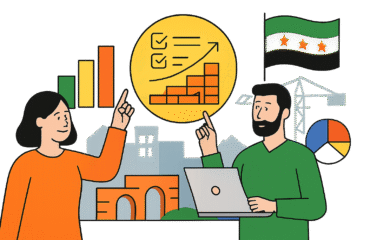
Small Projects: The Engine of Economic Recovery in Post-Conflict Syria, Lessons Learned and Data
- Small and medium projects play a fundamental role in building the economy post-conflict.
- Significant challenges face small projects in Syria, including scarce resources and a complex legislative environment.
- Experiences from other countries offer valuable lessons that can be applied in the Syrian context.
- “Insight Syria” is ready to support these efforts through reliable data and deep analysis.
- Investment in small projects is an urgent step towards economic and social stability.
Table of Contents
- Small Projects and Their Role in Building the Economy Post-Conflict Amidst Resource Scarcity and Economic Collapse
- Why Small Projects?
- Challenges Facing Small Projects in Syria
- Data and Figures from Similar Experiences: Lessons Learned
- Applying Lessons to the Syrian Context: The Role of “Insight Syria”
- Challenges Specific to Data and Research in Syria
- Conclusion and Recommendations
Small Projects and Their Role in Building the Economy Post-Conflict Amidst Resource Scarcity and Economic Collapse
Discussing small projects and their role in building the economy post-conflict amidst resource scarcity and economic collapse is not just a slogan, but a practical necessity dictated by current realities. After years of material and human destruction, infrastructural collapse, disrupted supply chains, eroded purchasing power of citizens, and unprecedented unemployment rates prevailed. In these circumstances, large companies, which require massive investments and a stable environment, are often unable to take a leading role in the immediate rebuilding process. This is where small and medium enterprises come in, acting as the primary engine for recovery.
Why Small Projects?
- Flexibility and Adaptability: Small projects are characterized by their flexibility and ability to quickly adapt to market changes and surrounding conditions.
- Job Creation: Small and medium enterprises are among the largest job generators in any economy.
- Meeting Basic Needs: Small projects often focus on producing basic goods and services.
- Enhancing Innovation and Entrepreneurship: Small projects encourage the spirit of initiative and entrepreneurship.
- Wealth Distribution: Small projects contribute to a broader distribution of wealth within the community.
Challenges Facing Small Projects in Syria
Despite the pivotal role of small projects, they face enormous challenges in Syria, most notably:
- Scarcity of Financial Resources: Difficulty in obtaining financing and loans, and high interest rates.
- Damaged Infrastructure: Weakness of basic infrastructure such as electricity, water, and road networks.
- Lack of Raw Materials: Difficulty in acquiring the primary materials necessary for production.
- Lack of a Supportive Legislative Environment: Complexity of laws and regulations related to business establishment and operation.
- Fear and Uncertainty: Lack of stability in security and politics.
- Loss of Skilled Labor: Emigration of skilled and educated workforce.
Data and Figures from Similar Experiences: Lessons Learned
To better understand how to build a strong economy based on small projects in post-conflict contexts, we can draw lessons from other countries’ experiences:
1. Rwanda: Transition from Shock to Growth
- Focus on Agriculture and Manufacturing: Supporting small projects in the agricultural sector.
- Facilitating Access to Financing: Establishment of dedicated financing programs for small projects.
- Investment in Digital Infrastructure: Improve trade transactions.
- Results: Rwanda has witnessed significant economic growth, with small and medium enterprises constituting over 60% of GDP.
2. Bosnia and Herzegovina: Rebuilding a Devastated Economy
- Financial and Training Support Programs: Providing support packages through international agencies.
- Simplifying Business Establishment Procedures: Reducing barriers for entrepreneurs.
- Ongoing Challenges: Addressing corruption and weak governance.
- Lessons: The importance of providing a supportive legislative environment.
3. Vietnam: From Planned Economy to Market-Oriented Economy
- Economic Liberalization: Opening the way to a market economy.
- Supporting Small and Medium Enterprises: Clear policies to support them.
- Results: Significant growth achieved, with small businesses representing more than 95% of enterprises.
Applying Lessons to the Syrian Context: The Role of “Insight Syria”
Analyzing data and figures from similar experiences provides us with a potential roadmap to overcome economic challenges in Syria. “Insight Syria” can play a pivotal role in this process by:
- Market Research and Opportunity Identification
- Opinion Polls to Understand Challenges
- Data Analysis to Support Decision-Makers
- Impact Measurement and Program Evaluation
- Providing Reliable Data in a Challenging Environment
Challenges Specific to Data and Research in Syria
When collecting data and figures from similar experiences and applying them to the Syrian situation, we must consider:
- Field Access: Access to some areas can be difficult.
- Trust and Credibility: Building trust with local communities.
- Source Verification: Need to verify data sources.
- Cultural and Social Sensitivity: Consideration of cultural and social sensitivities.
Conclusion and Recommendations
Small projects and their role in building the economy post-conflict amidst resource scarcity and economic collapse is the most important topic at the current stage of rebuilding Syria.
Key Recommendations:
- Create a Supportive Environment
- Facilitate Access to Financing
- Focus on Training and Capacity Building
- Investment in Infrastructure
- Encourage Innovation and Partnerships
- Leverage Local and International Expertise
By understanding past lessons, gathering accurate data, and working collaboratively, Syria can build a resilient and inclusive economy based on the capabilities of its people. “Insight Syria” is ready to be your partner in this journey.
Frequently Asked Questions
What are small projects?
Small projects are businesses that are independently owned and managed, often with a limited number of employees.
How can small projects be supported in Syria?
Small projects can be supported through providing financing, rehabilitating infrastructure, and training entrepreneurs.



